Fast food nation《快餐帝国》(精讲之六)
Download
Don't just hope. You can't sit back and hope.
You have to do something.
In a town like this, hope will kill you.
影片对白
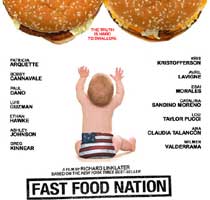
Pete: Hey, Sis. Sis-Whoa, whoa. Hey, hey. So, what would you say? Is Cody a better town today or back when we were kids?
Amber’s mother: I know what you would say.
Pete: What?
Amber’s mother: Your uncle hates everything, Amber. You know, I actually think it's better now. There's more stuff to do.
Pete: Oh, yeah. There's more to do. You got the Wal-Mart, the Kmart and the Target, right? You got Chuck E. Cheese. You got Taco Bell. You got Arby's. You got Mickey’s. You got Denny's. You've got, uh, Chili's. You got Applebee's. You got Wendy's. You got Hardee's, right? You got the- the K.F.C., the IHOP. Do they still have that Der Wienerschnitzel?
Amber: Oh, yeah.
Pete: Oh, thank God it's still hanging in there. You know, I don't know about you guys, but I could just piss away a whole Sunday afternoon at the Sunglass Hut.
Amber: Oh, have you ever been to the Sunglass Hut?
Pete: No, I never have. I'm not trying to come off like some Polly Perfect here. Right. I'm going to make some cabinets for some rich New York investment banker fuck who probably spends two weeks a year at his Montana ranch, so don't listen to me.
Amber’s mother: No, I'm not.
Pete: I'm not talking to you. I'm talking to your daughter. You know, I'm probably just going through some full-of-shit, early middle-age period.
Amber: I don't think you're full of shit.
Pete: Thank you. You see, she's so nice. What happened to you?
Amber’s mother: No, no, no, sweetheart, don't contradict your mother. He is full of shit. I don't waste a lot of time thinking about this stuff. Democrats, Republicans--they're all crooks.
Pete: This is why revolutions are meant for the young. If you don't do it now, you're never gonna. Uniform- uniformity. Conform- conformity. Monogamy- monotony.
Amber: No wonder you're not still married.
Amber’s mother: Stupid- stupidity.
Pete: Yeah, look- hey, the facts are not always friendly.
Amber’s mother: Listen to who's giving the lecture here, Amber. Your uncle did not finish college.
Pete: Jesus! Mm-hmm. Oh!
Amber’s mother: Okay? He’d lived in a camper for 18 months.
Pete: An air stream!
Amber’s mother: This is not a role model. Remind me to deprogram you after he leaves.
Amber: Hey, Mom said you got kicked out of college.
Pete: Oh, thanks, Mom.
Amber’s mother: Yeah, your mug shots are in all the papers.
Pete: Yeah, with eight others. I was at Colorado University. Right. We were the C.U. Nine.
Amber’s mother: Yeah, that notorious band of Midwestern, white freedom fighters.
Pete: No, no, no. We took over the chancellor's office. We were protesting the college's investment in South Africa.
Amber: So what happened?
Pete: All right, well, so, after about four hours, they come bursting through this barricade-
Amber’s mother: Okay, that was two chalkboards.
Pete: It's not two chalkboards. We had a bunch of ropes with some chair. Look, they practically beat the shit out of all of us. They treated us like a band of terrorists.
Amber’s mother: You got your little ass kicked out of college - which he never finished.
Pete: Big deal.
Amber’s mother: It cost our dad $2,000 in legal fees.
Pete: Which I eventually paid him back. Anyway, meanwhile-cut to-About a year later, the college divests all its holdings in South Africa and a little while after that, Nelson Mandela is a free man.
Amber’s mother: All because of the "C.U. Nine."
Pete: No, nobody said that. Nobody even thought that, all right. The point is... that, you know, if enough people start thinking about something and trying to actually do something, you can change things for the better.
Amber: I believe that.
Amber’s mother: Well, I hope they can change for the better.
Pete: Don't just hope. You can't sit back and hope. You have to do something. In a town like this, hope will kill you. It's your move.
妙语佳句,活学活用
1. Hang in
Hang in 是个口语用法,也常说成是 hang in there,本来的意思是“To persevere坚持不懈”,这里表示“(那家店)仍然在营业”。我们来看个例子:She has managed to hang in despite years of bad luck.
2. Piss away
Piss away 的意思是“Squander, waste 浪费”,例如:They've pissed away a fortune on those horses. 看到有piss在内,大家一定知道这个也是个不太文明的讲法了,所以要小时使用哦。
3. Come off
Come off 在这里的意思是“表现”,例如:Whenever challenged he comes off badly.
4. Polly Perfect
在英语儿歌中,有首关于housewife Polly 的儿歌,在美国还有个电视节目,一个Polly 主妇教人们怎样烹饪,因此在这个片段中,Pete 的意思是“他并不像Polly Perfect 那样是个美食家”。
5. Role model 模范,榜样
6. Mug shot
人的面部照片,尤指警察局存档用的或通缉用的照片。
7. Beat the shit out of
意思是“把某人打得落花流水,满地找牙”,见到有shit在内,大家应该知道这也是比较粗俗的讲法,要慎用。我们来看个例子:We're gonna beat the shit out of you!
8. Big deal
Big deal 本意是指“重要的事”,但用在讽刺的语气中则表示“So what? Who cares?有什么大不了的”。
9. Cut to
Cut to 本意是指拍片的时候转换到另一个镜头,例如:The camera cut to the sky.这里则表示“打住,插一下”,将谈话转换到另一件事情上。
文化面面观
Fast Food Nation: The Dark Side of the All-American Meal
Fast food nation 这部电影是根据 Fast Food Nation: The Dark Side of the All-American Meal这本书改编的。该书早在2001年就已经问世。但显然,还是影像的影响力要大,是电影让书更深入人心。
Fast Food Nation: The Dark Side of the All-American Meal is a book by investigative journalist Eric Schlosser that examines the local and global influence of the United States fast food industry.
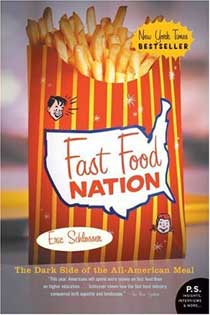
Schlosser examines the history and growth of fast food restaurants in American culture. Schlosser argues that the fast food industry wields powerful economic - and therefore political - influence on American culture, and exploits that influence to increase profits at the expense of public health and the social conditions of its workers. In the process of making that argument, however, he provides an interesting portrait of the way fast food culture is a unique product of American history, related to the emergence of the automobile, the homogenization of corporate culture, changes in labour conditions, and of course, globalization. He also provides surprisingly respectful biographies of some of the "founding fathers" of fast food, including Carl Karcher, Ray Kroc, and others. The fast food industry, writes Schlosser, "has helped to transform not only the American diet, but also our landscape, economy, workforce, and popular culture".
Schlosser opens the book with the ironic delivery of a Domino's pizza to the "top secret" military base, Cheyenne Mountain in Colorado. He describes various high-tech capabilities of the base and its extensive defensive system, speculating that if the worst were to happen and the entire base were entombed in the mountain, anthropologists of the future would discover random fast food wrappers scattered amongst military hardware. Both, suggests Schlosser, give important clues about the nature of American society.
The book continues with an account of the evolution of fast food and how it coincided with the advent of the automobile. He explains the transformation from countless independent restaurants into a few uniform franchises. This shift led to a production-line kitchen prototype, standardization, self-service, and a change in marketing demographics: from teenager to family-oriented. Regarding the topic of child-targeted marketing, Schlosser explains how the McDonald's Corporation modeled the marketing tactics of The Walt Disney Company, which inspired the creation of advertising icons such as Ronald McDonald and his supporting characters. He also mentions the implementation of toys in McDonald's renowned 'Happy Meals' as an example of the issues presented in his proposed argument. The theory behind this shift to child-targeted marketing was that it would not only attract children but also their parents and grandparents as well. More importantly, it would instill brand loyalty in them, which would persist throughout adulthood through nostalgic associations to McDonald's. Its ills are discussed: the exploitation of children's naivety, trusting nature and that the average child watches 21 hours of television per week. This also includes 100,000 tv advertisements a year.
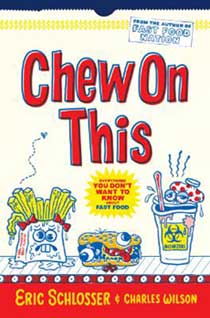
Schlosser states that corporate tax cuts that have compromised school funding have presented many corporations with the opportunity for sponsorship within those same schools. According to sources, 80% of the sponsored textbooks contain material that is biased in favor of the sponsors, and 30% of high schools offer fast foods in their cafeterias. Furthermore, high school student Mike Cameron was suspended from school for an incident on "Coke day"; during a promotional event, the student exhibited a Pepsi t-shirt while he and other students clad in red and white formed the word 'Coke' in the football field that was to be photographed aerially.
In his examination of the meat packing industry Schlosser finds that it is now dominated by casual, easily exploited immigrant labor and that levels of injury are among the highest of any occupation in the United States. Schlosser discusses his findings on meat packing companies IBP, Inc. and Kenny Monfort. Also, Schlosser retells the steps of meat processing, and notes several hazardous practices unknown to most consumers; for example, the practice of rendering dead pigs & horses and chicken manure into cattle feed. Schlosser notes that practices like these were responsible for bovine spongiform encephalopathy (BSE, aka Mad Cow Disease 疯牛病), as well as introducing dangerous bacteria, such as E. coli O157:H7 (大肠杆菌中的一种), into the food supply.
Schlosser notes that there are more robberies at fast-food restaurants than at banks, gas stations or convenience stores.
In the later section of the book, the fast food industry's role in globalization is discussed, linking increased obesity in China and Japan with the arrival of fast food. A summary of the McLibel case is included.
In later editions, Schlosser has added a final section, including reviews of his book, counters to some critics that emerged since first publication, and then discusses the effect that the threat of BSE had on the US Government’s policy towards cattle farming. He concludes that, given the swift, decisive and effective action that took place as a result of this interest and intervention, many of the problems documented in the book are solvable, given enough political will.
我观之我见
Fast Food Nation & Super Size Me
在戛纳影展的新闻上第一次看到这部片子的消息,就想到04年的那部纪录片 Super Size Me。
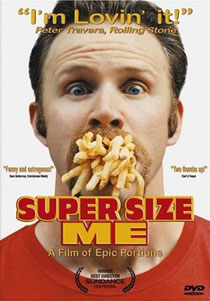
Super Size Me 讲的是一个叫Morgan Spurlock的年轻人用自己做试验,连续三十天吃麦当劳,看看最后会出现什么结果。
Morgan Spurlock 的实验规则是这样的:1.只吃麦当劳销售的食物,包括饮料;2.不买加大套餐或者汉堡、饮料,除非服务员主动提出;3.菜单里的每种食物都吃至少一次。同时,Morgan Spurlock 还特别请了3位医生为整个实验过程做记录,定期追踪他的健康状态。然后他出发上路,一路吃着麦当劳到美国20个城市采访医生、健康顾问、厨师、小孩,探寻健康与快餐的关系。
在拍摄纪录片之前,身高6呎2寸的 Spurlock 身体健康,体重185磅(约84公斤)。在试验进行了两个星期之后,医生说他的肝受到严重损伤,应当停止试验。但他没有听从医生的劝告。三周左右,他的心脏开始异常。当实验进行完毕后,他的血压大大高升,体重也增加了11公斤。
这个电影在圣丹斯电影节上获得大奖,同时也在美国引起了轰动,更多的人开始重新对待快餐。只是Spurlock为此也付出了巨大的代价,身体健康状况大不如前,超标的体重花了一年多的时间才被重新减了下来。
和纪录片 Super Size Me 相对轻松的氛围比较,Fast Food Nation 显得相当沉重。影片由三条线组成。Don 被 MICKY’S 总部派遣出来查访为什么汉堡的肉饼里会有屎。他到了牛肉屠宰和包装公司,看到的都是谎言和欺骗。Don 一路查访,在得知真相后发现这一事件所牵扯到的千丝万缕的联系和利益纽带,尤其是会对自己的利益构成威胁后,放弃调查,听之任之了。
第二条线是那些因为贫穷偷渡到美国的拉美裔和墨西哥人。他们不懂英语,也没有职业技能,虽然屠宰厂的工作既危险又没有保障,但好过没有收入。工厂的工头恣意蹂躏漂亮的女员工。高强度的工作使得工人们靠嗑药来维持精力。毒品蔓延,工伤层出不穷。而一旦出了工伤,也得不到工厂的赔偿。
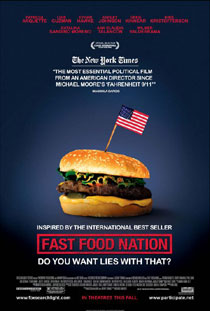
第三条线是讲述一个在快餐店工作的女孩 Amber。Amber 认识到了快餐行业的种种残忍之处,在舅舅的影响下,放弃了那里的工作,加入到激进的学生团体中,并实行了一个“拯救肉牛”的计划,因为牛的不肯逃跑而失败了。
影片耐人寻味的地方比比皆是。中间商 Harry 和 Don 明知道汉堡里有屎,还是吃进嘴里;他们欺骗别人,也欺骗自己。被给予自由的牛却不愿跑向草原,即使明知道自己的命运是死亡,也还是继续这种吞食垃圾的日子,不敢去向自由、但自己一无所知的生活。也许这些牛也和人一样,习惯了,就不想也不敢改变。
我相信人人都对生活、对世界有着美好的愿望。人人也都会对不好的事情表现愤怒和谴责。但是要把世界变得美好并不是希望和谴责就够了的,还需要切实的行动,就像 Pete 舅舅对 Amber 所说的那样:Don't just hope. You can't sit back and hope. You have to do something. In a town like this, hope will kill you. 看看日益恶化的生存环境,想想那已经签署多年、多如牛毛的联合国环保公约和有增无减的污染物排放量,看看历次环保会议上各个国家互相指责的嘴脸……聪明的人类何时才能停止内斗去做对自己有益的事情呢?我们欺骗自己,最终也会毁掉自己。
考考你
用今日所学将下面的句子译成汉语。
1. Hang in there! You'll soon catch on to the language.
坚持学习!你很快就会掌握这种语言的。
2. He came off badly when challenged by reporters at the press.
在新闻发布会上,面对记者的提问他表现的很糟糕。
Fast food nation《快餐帝国》(精讲之五)考考你 参考答案
1. 他的笑声真是让我冒火。
His laugh really gets under my skin.
2. 那种音乐总能打动我。
That sort of music always gets under my skin.
3. 我们得减少支出了。
We have to cut down on our expenses.